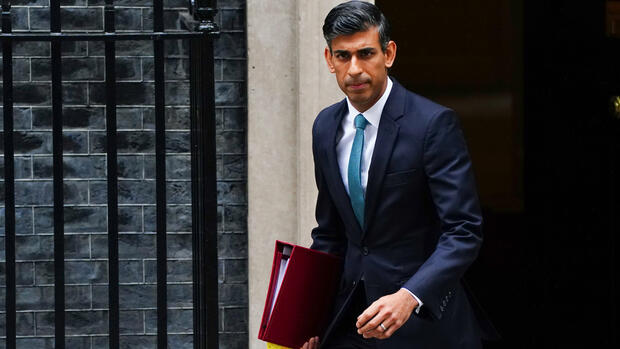The prime minister wants to make Great Britain the stronghold for artificial intelligence.
(Photo: dpa)
London Recent advances in the development of artificial intelligence (AI) have not only triggered a technological race between companies and nations. At the same time, governments compete to determine who should determine the global rules of the game for the new technology. After Brexit, Great Britain sees itself in a good starting position between the far-reaching regulatory ideas in the EU on the one hand and the “laissez-faire” attitude in the USA on the other.
British Prime Minister Rishi Sunak therefore wants to use his visit to Washington this week to win over US President Joe Biden for his ideas for global AI regulation, which the British hope could be controlled from London. This became known from government circles in London before Sunak’s departure for Washington.
According to reports in the British media, the government is planning an international conference of all important players for the autumn, to which China is also to be invited.
At the core of the British considerations are two ideas that are already being discussed in the technology industry: For example, there could be joint cutting-edge research for artificial intelligence in a “controlled environment” based on the model of the CERN nuclear research center in Geneva. In parallel and possibly as a complement, the American technology manager Sam Altman brought up the idea of an international monitoring authority for AI based on the model of the International Atomic Energy Agency IAEA.
Altman is the head of OpenAI, the company that developed the chatbot ChatGPT. Together with his colleagues from the American AI developer Anthropic and the Google subsidiary Deepmind, he recently discussed the dangers of the new technologies with Sunak in London. The three tech managers had previously warned of the risks of uncontrolled development of AI in a public appeal together with other industry representatives. These include, among other things, the spread of false information and the displacement of human labor by intelligent machines.
AI should play a central role on the way to becoming an “innovation nation”.
However, Sunak’s initiative represents a change of heart within the British government. As recently as April, Treasury Secretary Jeremy Hunt downplayed the risks of AI and promised that Britain would not put “protectionist barriers” at risk to its leadership in the technology race. In doing so, he was apparently in line with his technology-loving prime minister, who was educated at the elite Stanford University and who wants to transform the kingdom into an “innovation nation”, also thanks to the “Brexit freedoms”. AI should play a central role in this. In April, the UK government provided £100m (€116m) to speed up the adoption of the technology.
At the same time, the Alan Turing Institute presented a new AI strategy that focuses primarily on the use of intelligent machines in healthcare, environmental protection and national security. “We want to harness the revolution in data science and AI and direct their energy towards solving some of the biggest challenges facing our society,” said Turing Director Adrian Smith.
Read more about artificial intelligence
However, at the meeting of the seven leading industrialized nations (G7) in Japan, Sunak struck a new note, insisting that the benefits of AI could only be achieved if “safeguard regulations” were also observed. Apparently, people in London have recognized that in the locational competition for new technologies, you can only keep up if you also give the tech pioneers a set of rules.
However, the struggle over the regulation of the technology industry in Great Britain has not yet been decided. The British competition authority, the Competition and Market Authority (CMA), is to be given more powers and recently blocked Microsoft’s takeover of the video game manufacturer Activision Blizzard. However, there is resistance within the governing Conservatives as well as against the planned “Online Safety Bill”, which is intended to provide better handling of illegal content on the Internet.
Great Britain faces a dilemma similar to that of the EU: on the one hand, the aim is to keep the location as attractive as possible for international tech companies, on the other hand, there is a need for clear regulatory guidelines for technical progress, not only from a socio-political perspective, but also more and more from the companies themselves.
OECD launches new technology platform
The American AI developer Anthropic recently chose London as its location in Europe. OpenAI boss Altman has criticized the EU’s planned AI framework as “over-regulation,” but he withdrew suggestions that his company could leave the EU as a result. Nonetheless, this is another example of how companies and governments are being torn between the technology race and the competition to regulate it.
Western technology and research ministers are meeting in Paris on Tuesday to find a common line for the development of what is probably the most important technology in the coming years within the framework of the Organization for Economic Cooperation and Development (OECD). The OECD wants to set up a new “Global Forum on Technology” for this purpose. However, China is not at the table – one of the leading nations in the development and use of AI.
More: EU urges rapid self-commitment by AI companies
